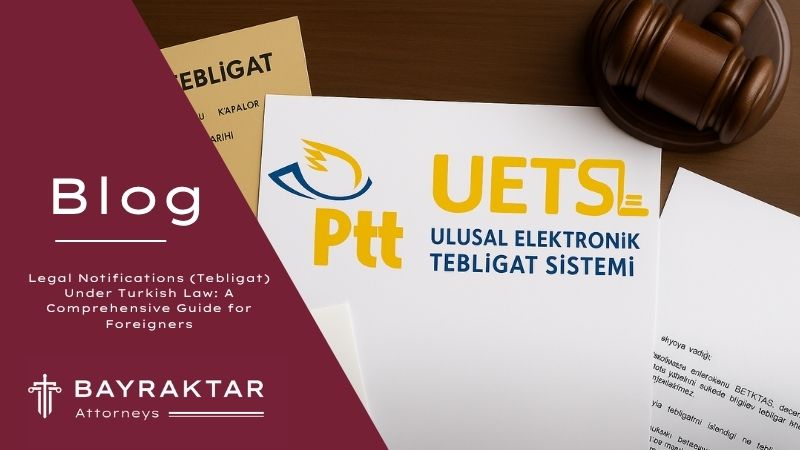
Tebligatlar, or legal notifications, are official documents of informative nature. Under Turkish law, they must be delivered by authorized individuals or institutions in accordance with proper procedures. In this blog, we will examine the concept of tebligat in depth.
What Is a Tebligat (Legal Notification)?
Tebligat refers to the official delivery of legal documents or procedural papers prepared by public institutions to the relevant persons or authorized representatives. It ensures that individuals are properly informed of legal actions affecting their rights and obligations.
Why Are Tebligats Sent?
Authorities can send a tebligat for a wide range of matters, such as:
Enforcement proceedings(e.g., debt collection or seizure notices)
Petitions
Penalties or fines
Court decisions or rulings
What Information Does a Tebligat Include?
Depending on its nature, a tebligat envelope may include the following:
The subject of the notification
What is being requested from the recipient
Details of the sender
The date of issuance
If it initiates a legal process, it may also include:
Legal grounds and parties involved
Court or authority signature and stamp
What Should You Do After Receiving a Tebligat?
Once you receive a tebligat, it is very important to respond correctly. Some notifications may require you to take action within a legal time limit, such as sending a response, filing an objection, or making a payment. If you do not act within the given time, it can lead to serious legal consequences.
Can a Tebligat Be Challenged?
Yes. If you believe that the tebligat is unfair or incorrect, you have the right to challenge it. However, the challenge must meet legal requirements and be submitted within the statutory time limits in order to be valid.
Types of Tebligats
Turkish law recognizes various types of legal notifications, including:
1. Sealed (Envelope) Notification
Used for formal matters such as:
Court decisions
Warnings (ihbar)
Annotations
Hearing schedules
Official reports
Indictments
2. Electronic Notification (e-Tebligat)
Delivered via the National Electronic Notification System (UETS). Only individuals or institutions authorized under law can use this method.
3. Article 21/2 Notifications
When the recipient is not found at the registered address in the Address Registration System (MERNIS) or has moved away, officials may deliver the tebligat under Article 21/2 of the Notification Law.
4. Article 35 Notifications
If a person changes their address after a previous valid tebligat and fails to inform the court or authority, subsequent notifications are sent to the last known address. These are considered legally valid even if not received in person.
How Are Tebligats Delivered?
Authorities will first attempt to deliver the notification to the individual's known or current address. If unsuccessful, delivery is attempted via their MERNIS address.
Delivery to Natural vs. Legal Persons
Delivery to Individuals:
The main rule is to deliver the tebligat directly to the person concerned. However, if the recipient is unavailable, it may be delivered to someone else residing in the same household (e.g., a family member or servant). This person must reside at the same address permanently. (Art. 16 and related regulations)
Delivery to Legal Entities:
Notifications must be delivered to authorized representatives of the legal entity. If there are multiple representatives, delivery to just one is sufficient. If they are not present, it may be served to an employee at the office.
What Is an Invalid (Improper) Notification?
If a tebligat is not delivered in accordance with the procedures set out in the law, it is deemed invalid. However, if the recipient becomes aware of the notification, the date they learn about it becomes the legal notification date.
Should a Tebligat Be Sent to the Individual or Their Attorney?
This is a critical issue. If a person is represented by an attorney and the attorney has submitted a power of attorney, then the tebligat must be sent to the attorney. A notification delivered directly to the client is considered legally invalid. However, if the matter concerns a personal issue that must be handled directly, then the notice must be served on the individual.
Court of Cassation (Yargitay) Precedents on Tebligat
1. Invalid Notification Decision:
In the case numbered 2019/12-630 E., 2022/1087 K., the Court ruled:
"Due to the formal nature of Article 21/1 of the Notification Law, when informing neighbors, janitors, or building managers, their identity must be documented by the delivery officer. If not, the notification is invalid."
2. Kamulaştırma (Expropriation) Notification:
In case 2019/5-701 E., 2022/1027 K., the Court emphasized that notifications must follow legal procedures outlined in the Expropriation Law, including those made through notary or publication in a newspaper.
Special Rule for Foreigners in Türkiye: UETS Address Requirement
Foreigners who are renewing their residence permits in Türkiye, not applying for the first time, are required to get a UETS electronic notification address. Any official messages sent to this address are considered legally delivered, even if the person does not read or open them.
If a payment order or other legal document is sent to this address, you may have only 5 or 7 days to object, depending on its nature. If you miss this deadline, the debt or penalty may become legally binding.
Therefore, it is critical for foreigners to monitor their UETS accounts regularly.
If you receive a legal notification either by PTT mail or electronically through UETS, you should immediately consult a qualified attorney to assess your legal rights and options.
Need Help Responding to a Legal Notification in Türkiye?
At Bayraktar Attorneys, we help both foreigners and Turkish citizens navigate legal notification procedures. Whether it’s a tebligat received through the post or UETS, our experienced legal team ensures your rights are protected. We will review your documents, guide you on objection procedures, and represent you in the event of any legal consequences.
Contact us today if you've received a legal notification and need assistance with objections, litigation, or compliance.
Recently Added Blogs



.png)
.png)
.png)
.png)
